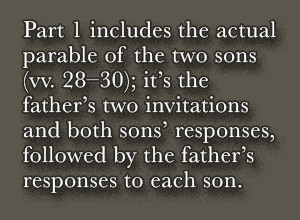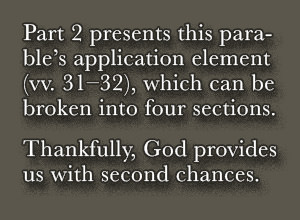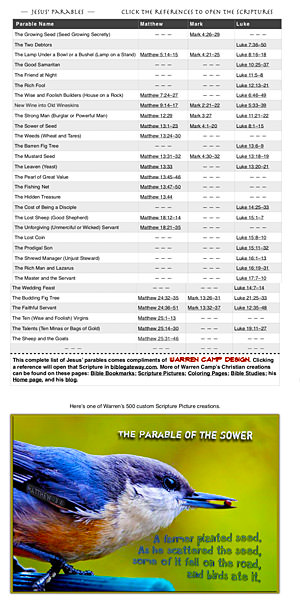Jesus’ Parable of Two Sons contrasts two groups: (1) tax collectors and prostitutes who initially lived sinful lives but repented and accepted John the Baptist’s message and (2) Religious leaders who claimed to be righteous but rejected John’s message and Jesus himself.
The key points are:
† The first son represents sinners who repented, while the second son represents hypocrites who only paid lip service to obedience.
† Jesus likens the first son to tax collectors and prostitutes who believed John the Baptist, despite their initial disobedience to the Law.
† The second son is typically seen as representing the religious leaders who claimed obedience but didn’t truly follow God’s will.
† The parable emphasizes that true repentance and obedience are more important than outward appearances of piety.
— Preview —




Click the list or the “bird” to enlarge and use Warren’s list of forty-four of Jesus’ parables (a PDF file with links to Scriptures).
par•a•ble [noun] a simple story used to illustrate the meaning of or a moral or spiritual lesson, as told by Jesus in the gospels
synonyms: allegory, moral story/tale, fable
Jesus’ Parable of Two Sons
Matthew 21:28–32
The Parable of Two Sons is about obedience and disobedience. Jesus’ parable told the priests that they’d claimed to accept the message from God but they’d failed to live up to it by simply being obedient. Outwardly, they were pious and appeared to be people of God, but God knew their heart. And it was in their hearts that they failed miserably.
To appreciate this Christian life parable, we must first put it into context. Matthew chapter 21 begins with Jesus’ triumphal entry into Jerusalem. The purpose of his gospel was to demonstrate to Jewish leaders the fact that Jesus was their long-awaited Messiah. As Jesus entered Jerusalem, seated on a donkey, the crowd responded by shouting “Hosannas” and praises to the King. Jesus — specifically and intentionally — introduced this parable to the chief priests, elders, and Pharisees who’d just questioned his authority after he’d cleared the temple of buyers, sellers, and money changers (vv. 12–17).
Matthew tells us that Jesus, immediately after cleansing the temple, cursed a fig tree (vv. 18–22), thereby making a symbolic point. A fig tree was often symbolic of Israel. The fact that this one fig tree had leaves but lacked fruit symbolized Israel’s religious practice (i.e., all the trappings of spirituality but without substance). Israel might have had “leaves of practice,” but it lacked the “fruit of repentance and obedience to God,” which was why Jesus told the priests and elders: “Truly I tell you, the tax collectors and the prostitutes are entering the kingdom of God ahead of you” (v. 31).
This parable introduces us to two brothers whose father told them to work in his vineyard. The first son told his father that he didn’t care to do that work but he eventually obeyed and worked all day there for his dad. The other son initially expressed obedience but instead disobeyed his dad and refused to work.
Jesus then asked the question the Jewish leaders, “Which of the two did the will of his father?” The answer is clear: The son who did the will of his father was the one who eventually obeyed and performed work, though initially refusing to do so. Jesus then likened the first son (the obedient one) to tax collectors and prostitutes — the outcasts of Jewish society — because they were people who believed John the Baptist and accepted “the way of righteousness” (v. 32), in spite of their initial disobedience to the Law.
Here’s an easy-to-realize presentation of Jesus’ “Parable of the Two Sons.”
A 1.2-minute video, compliments of Strong Hands Enterprises.
This informative, action-packed video defines all three parable participants.
This 6-minute video comes to you compliments of Scripture Central.
Note: The Parable of the Pharisee and the Tax Collector is another parable that highlights this idiom: “Actions speak louder than words.” Both parables have a similar theme of outcasts becoming righteous people in God’s eyes.
The Parable of Two Sons
God Accepts Those Who Repent and Offer Themselves to Him
The Parable’s Setting
The Parable of Two Sons (found only in Matthew) is one of a group of three parables with the same theme built around obedience and disobedience to Christ. All are found in Matthew 21:28–22:14. This Two Sons Parable is the first, followed by the Wicked Tenants Parable (vv. 33–46), then the Wedding Banquet Parable (22:1–14). All three share the same thread — the acceptance and rejection of Jesus. Each was told to Jewish religious leaders, illustrating their rejection of Jesus and a pronounced judgment on Israel for its rejection of their Messiah. Herein, the leaders of Israel represent the second son who claimed obedience but didn’t respect or follow the will of the father.
This Two Sons Parable, along with many others, is split into two parts. Part 1 includes the actual parable of the two sons, contained in vv. 28–30. This first part can be summed up as the father’s invitations and the sons’ responses, followed by the father’s responses to each son.
Part 2 presents the parable’s application element (vv. 31–32), broken into four sections, which theologian Donald Hagner designates as: “(1) the faithful response of the first son; (2) the faithful response of tax collectors and prostitutes; (3) the contrast between unbelieving Jewish leaders and the faith of the tax collectors and prostitutes with respect to John the Baptist; and (4) a repeated indictment of Jewish leaders for their hardheartedness.” Remember: The audience to which Jesus spoke was made up primarily of Jewish leaders, chief priests, and Pharisees.
The Analysis of Jesus’ Teaching
In Matthew’s telling of this parable, Jesus invited the listeners to interact with him when he asked them, “What do you think?” (v. 28). By these words, Jesus put them on notice that he was about to present something to them that would require an answer. They, therefore, would have to give him their strictest attention. He then dove in and told the captivating story of the father asking his two sons to work in the vineyard.
Both sons are compared metaphorically. You might see the parable’s father as God, the vineyard as Israel, and the two sons as two categories of people: (1) those who obey and (2) those who don’t. But it’s likely that Jesus focused on making this parable one that would teach a theological message. In that case, it’s possible that Jesus cast himself as the first son. This becomes clearer as we go back to the original Greek text in the King James Version of the Bible, which is expounded upon in the next paragraph. Jesus would then present the second son as Satan, the one who said he’d go and work for the Father but ultimately turned away and didn’t work for the father as asked. However, there’s no clear evidence that Jesus portrayed him and Satan as this parable’s sons. This parable appears to be focused on human responses to God’s call rather than spiritual beings.
The response of the first son to his father’s request to go and work is translated as, “I will not” (21:29 NIV, ESV, KJV, NKJV, RSV). Although that sounds rebellious, the Greek word translated as “will” in Matthew 21:29 is related to the concept of desire. In the context of this parable, the Greek word ou thelō is used, which means “I don’t want to,” “I don’t wish to,” or “I’d rather not.” This indicates a present-tense expression of desire or preference, rather than a future intention or promise. The parable highlights the contrast between the initial refusal of the first son to do the father’s will and his subsequent change of heart, which suggests a shift in desire or willingness.
The significance of ou thelō in the context of the parable is that it highlights the difference between initial verbal refusal and the actual subsequent action. The parable emphasizes that true obedience isn’t just about saying the right words but involves the willingness to act accordingly, even if it means changing one’s initial stance. This is contrasted with the second son who verbally agrees to work but doesn’t follow through, illustrating that actions speak louder than words when it comes to fulfilling one’s obligations or desires.
By the first son’s refusal to do as his father asked, he wasn’t only disobeying, but was, at the same time, rebelling against his father’s authority. Eventually, the first son changed his mind and obeyed his father’s directive.
Jesus tells us in v. 30: “Then the father went to the other son and said the same thing. He answered, ‘I will, sir,’ but he did not go.” The Jewish rulers, though all the while professing to be zealous for the will of God, utterly refused to enter the kingdom or work therein, as God bade them to do by the voice of John the Baptist.
The father then gave direction to the second son who responded in a way that might remind us of Elijah’s response to God: “Here am I.” The second son initially agreed to go (v. 30); he even strengthened the affirmation of his agreement by referring to his father as “sir” (or “lord” in some translations). However, after acting in opposite ways to the first son, the second son refused to work in the vineyard, breaking his promise with his [F]ather.
Then Jesus asked the critical question (v. 31): “Which of the two did what his father wanted?” “The first," they answered. They gave the correct answer without perceiving that, by so doing, they confirmed that Jesus’ parable had condemned them.
He asked his follow-up question to the crowd that had gathered. Those answering which son did the will of his father weren’t aware of the upcoming judgment that was about to be inflicted on them as a result of what they were about to say. The elders and chief priests answered with an, Of course, the first son was in the will of his father. Jesus continued with the correlation by expressing that those who deemed themselves to be “righteous” hadn’t heeded the words of repentance spoken by John the Baptist. By rejecting John’s directives, they effectively rejected Jesus.
Jesus said to them, “Truly I tell you, the tax collectors and the prostitutes are entering the kingdom of God ahead of you. For John came to you to show you the way of righteousness, and you did not believe him, but the tax collectors and the prostitutes did. And even after you saw this, you did not repent and believe him” (v. 32).
For us, today, a problem sometimes arises when we’re so “confident in our righteousness” that we “trust that it will save us and justify us before God.” When we move from living righteously to expecting our righteous living to give us a good standing before God, we’ll have committed a fatal error. In this case, we’ve permitted “righteousness” to become “self-righteousness.” I think it’s important to appreciate the wording in Matthew’s account pertaining to “the changing mind” of the first son. The word given in the translation to mean “change one’s mind” can also be seen as repenting or feeling regret or remorse.
Jesus went on to insult his listeners by painting a picture of so-called “sinful” tax collectors and prostitutes entering the kingdom before the “righteous” religionists. It’s important to realize that by allowing others to enter God’s kingdom before (or preceding) the Pharisees didn’t exclude the Pharisees themselves from doing similarly. On the contrary, they were welcomed into his kingdom, as are all of God’s children, then and today.
Interestingly, although the Pharisees might have chosen to repent, this parable puts them at the end of the line. Nevertheless, whether they’d be at the front, middle, or end of the line doesn’t matter. The point is, Jesus intentionally invited into his kingdom those who’d previously rejected him.
Without understanding the culture of the time and the Greek-to-English translation of this encounter, this parable and Jesus’ interpretation of it for the Jewish leadership may seem at the very least confusing. First, it helps to see the parable as Jesus intended it, as a metaphor. In the parable, the father, who is God, asks his two sons to go into the vineyard or down to the world and work for him. In this, Jesus cast himself as the first son. The response of the first son to Father God’s request to go and work is translated as, “It’s not my will to do so.”
Jesus taught on many occasions that he came not to do his own will but the will of his Father. In this context, we can see how the first son in the parable is in fact Jesus; therefore, the second son is naturally Satan, the one who said he’d go and work for the Father but ultimately turned away and didn’t do what was asked. Additionally the Greek phrase translated as, “he repented” (v. 29), would be better translated as, he reconciled himself. So, it is not that Christ needed to repent but to find the courage and resolve to do his Father’s will.
Because of the Jewish leaders thorough understanding of the concept of heavenly councils, once Jesus reminded them that this parable emphasizes recognizing authority, they probably would have understood the implications of this parable and recognized Jesus’ claim to be the first son of Father God. He taught them that they knew the signs given of those in authority but chose to ignore them for selfish reasons. They saw themselves as inherently better than publicans and harlots, but as Jesus had taught them, the publicans and harlots believed John the Baptist, repented, and were baptized. But those who lived by the law their entire lives turned from what they knew and refused to believe, repent, and thus be saved from their sinfulness.
Maybe in this light, these Jewish leaders were like the second son, promising to do the Father’s work but ultimately lying and abandoning that assignment, leaving it to the first son to do alone.
A Hearty Way to Apply This Parable Today
Today, it doesn’t seem strange to disobey a parent’s request. Society is full of disobedient youth lacking respect for adult authority figures in their lives. During the days of Jesus’ ministry, things were looked at differently. The importance of the personal relationship stressed here is essential to appreciate; it helps illustrate the weight of a child’s decision to follow a father’s request. In this parable, Jesus condemned those who merely said but didn’t do. He’s emphasizing the importance of faith with works. If we call ourselves believers, our actions must match our statements.
A second chance: An encouraging aspect of this parable is the acceptance of those who may reject God at first, but, in the end, decide to follow Christ’s teachings. The first son rebelled against his father as many believers do today; thankfully, God always accepts those who want to return and offer themselves back to him. Likewise, God also invites those who resemble the Pharisees to enter his kingdom. Each “child,” “son or daughter,” or “Hearty Boy” has the chance to become part of God’s glory. He also provides us with second chances. When we decide to follow him we must make a sincere, devoted, active, hearty effort to seek and remain in him.
“Truly I tell you, the tax collectors and the prostitutes are entering the kingdom of God ahead of you” (Matt. 21:31b).

